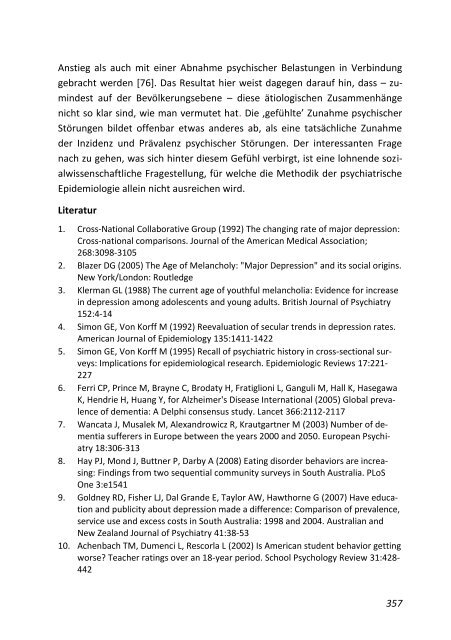- Seite 1:
Dieser Band dokumentiert Vorträge
- Seite 4 und 5:
Psychiatrische Pflege, psychische G
- Seite 7 und 8:
Vorwort der Veranstalter: Der 5. Dr
- Seite 9:
Wir bedanken uns herzlich bei allen
- Seite 12 und 13:
Kalifornische Massage als eine Mög
- Seite 14 und 15:
Kongruente Beziehungspflege am Fall
- Seite 16 und 17:
Psychische Gesundheit, Public Healt
- Seite 18 und 19:
gebildet wurde.... Gesundheit ist i
- Seite 20 und 21:
pflegerische Interventionen zentral
- Seite 22 und 23:
Wie kann das im Sinne der Salutogen
- Seite 24 und 25:
Revovery, Psychiatry and Nursing (R
- Seite 26 und 27:
Im Recovery-Ansatz wird sehr radika
- Seite 28 und 29:
stellung von Grundsätzen für die
- Seite 30 und 31:
professionell Tätigen, manche Stud
- Seite 32 und 33:
- Trauerprozesse, die Gefühle des
- Seite 34 und 35:
Recovery ohne Psychiatrie: Alternat
- Seite 36 und 37:
lappland gibt es eine Vielzahl funk
- Seite 38 und 39:
Grundlegende Reformen und praktikab
- Seite 40 und 41:
Ergebnisse Krankenpflegekräfte in
- Seite 42 und 43:
Posttraumatische Belastungsstörung
- Seite 44 und 45:
Zerssen-Index für die psychovegeta
- Seite 46 und 47:
Aggression nicht auf Vorfälle mit
- Seite 48 und 49:
Traumatische Ereignisse am Arbeitsp
- Seite 50 und 51:
Problemanalyse, Ausgangspunkt des P
- Seite 52 und 53:
Die MitarbeiterInnen erleben die vo
- Seite 54 und 55:
Kooperation in der interprofessione
- Seite 56 und 57:
Abbildung 1: Interdisziplinärer Pr
- Seite 58 und 59:
Abbildung.2: Ablauf Interprofession
- Seite 60 und 61:
Ergebnisse Dokumentenanalyse Im vor
- Seite 62 und 63:
zurzeit vor der Einsetzung des Inte
- Seite 64 und 65:
Psychiatrisches Case Management der
- Seite 66 und 67:
sind meist damit verbunden und von
- Seite 68 und 69:
Primary Nursing in Zeiten der Koste
- Seite 70 und 71:
Schlussfolgerungen: Primary Nursing
- Seite 72 und 73:
Der unpräzise Begriff des Wohlbefi
- Seite 74 und 75:
ezüglich sozialer Vergleiche, nich
- Seite 76 und 77:
triebsleitung der LWL-Klinik Herten
- Seite 78 und 79:
Patienten massiert worden sind, der
- Seite 80 und 81:
sant. 88% gaben an, die Kollegen al
- Seite 82 und 83:
Gesünder leben, leicht gemacht (GL
- Seite 84 und 85:
eflektiert wird und evtl. eingetret
- Seite 86 und 87:
Motivations- und Entzugsarbeit bei
- Seite 88 und 89:
Dienste besetzt. Die Pflegefachleut
- Seite 90 und 91:
etwaige Drittpersonen, pflegerische
- Seite 92 und 93:
Abbildung 2: Nachbetreuung Abbildun
- Seite 94 und 95:
Schlussfolgerungen und Empfehlungen
- Seite 96 und 97:
pflegerischen Theorien in Beziehung
- Seite 98 und 99:
fener Hierbei ist es wichtig, indiv
- Seite 100 und 101:
„Also meine Eltern haben es kapie
- Seite 102 und 103:
nen und Professionellen, sowie die
- Seite 104 und 105:
hoffnungsfördernde Wirkung hin get
- Seite 106 und 107:
„Ich hatte damals ein Durcheinand
- Seite 108 und 109:
1. Lernprozess, Zeit: 18 der 22 Bef
- Seite 110 und 111:
weiteren Sinne zu verstehen, so fä
- Seite 112 und 113:
auch das vorliegende Projekt deutli
- Seite 114 und 115:
Selbstpflegekompetenzentwicklung be
- Seite 116 und 117:
Items bzw. für zwei offene Fragen
- Seite 118 und 119:
Alter wird hohe Bedeutung beigemess
- Seite 120 und 121:
Psychosomatik und Gerontopsychiatri
- Seite 122 und 123:
Durchführung: Die MitarbeiterInnen
- Seite 124 und 125:
Morgengymnastik Ziel: Sportliche Be
- Seite 126 und 127:
Herausforderndes Verhalten bei Pers
- Seite 128 und 129:
Forschungsfragen und -ziele Um subj
- Seite 130 und 131:
Methode der qualitativen Inhaltsana
- Seite 132 und 133:
dass eine hohe Motivation Pflegende
- Seite 134 und 135:
4. Höwler E (2007) Herausfordernde
- Seite 136 und 137:
stationäre Wiederaufnahmen bzw. st
- Seite 138 und 139:
logistischen Aufwand nach unserer e
- Seite 140 und 141:
leben erarbeitet. Zur Hospitation k
- Seite 142 und 143:
Gemäss der DIN ISO-Norm 9004 für
- Seite 144 und 145:
die Fragen diejenigen Aspekte abdec
- Seite 146 und 147:
Die Jugendlichen in der Studienstic
- Seite 148 und 149:
Schriftliche versus mündliche Befr
- Seite 150 und 151:
Kongress der DGKJPP, Berlin, April
- Seite 152 und 153:
gesagt, die Interpretation durch di
- Seite 154 und 155:
Widersprüche und Problemstellungen
- Seite 156 und 157:
lich, dass bei vielen Pflegenden Ü
- Seite 158 und 159:
8. Jordan S, Hardy B, Coleman M (19
- Seite 160 und 161:
Die gesetzliche Grundlage der Arbei
- Seite 162 und 163:
- Jährliches Mitarbeitertreffen mi
- Seite 164 und 165:
2. Tagesstruktur Beschäftigungsini
- Seite 166 und 167:
Unterstützung einer spontan gebild
- Seite 168 und 169:
und dissoziative Störungen ( Lähm
- Seite 170 und 171:
- Identitätsunsicherheit und Denks
- Seite 172 und 173:
den. Das Beispiel zeigt aber das gr
- Seite 174 und 175:
- Interdisziplinäre Zusammenarbeit
- Seite 176 und 177:
Passen Recovery und psychiatrische
- Seite 178 und 179:
se, die sich an für die einzelnen
- Seite 180 und 181:
zung und eine unerschöpfliche Gedu
- Seite 182 und 183:
Kenner der Recovery-Szene erarbeite
- Seite 184 und 185:
Daher wäre es ja besser, wenn wir
- Seite 186 und 187:
Pflege als menschliche Zuwendung Sa
- Seite 188 und 189:
Beginnen wir innerhalb der Klinik A
- Seite 190 und 191:
Somit bot sich dieser methodische A
- Seite 192 und 193:
Fallbeispiel Die Klinik, der Sozial
- Seite 194 und 195:
Akzeptanz dessen, was ich gehört h
- Seite 196 und 197:
Selbstbefähigung in der ambulanten
- Seite 198 und 199:
handlungskonzept ist in steter Weit
- Seite 200 und 201:
duelle handlungsorientierte Lösung
- Seite 202 und 203:
kurzum mehr Lebendigkeit. Die Kinde
- Seite 204 und 205:
ten Zeiten abgebrochen hatte. Einei
- Seite 206 und 207:
doch gehen. Recovery-Prozesse sind
- Seite 208 und 209:
Erfahrungen gewesen, die ich in der
- Seite 210 und 211:
eingezogen bin, hat mein zukünftig
- Seite 212 und 213:
selbst helfen. Ich bin wieder Kapit
- Seite 214 und 215:
Experienced Involvement - Erfahrung
- Seite 216 und 217:
chiatrie erfahrenen Menschen geleit
- Seite 218 und 219:
jahrzehntelange Erfahrungen mit uns
- Seite 220 und 221:
nicht, denn ich fühlte mich ja run
- Seite 222 und 223:
ungs- und antistigmatisierende Arbe
- Seite 224 und 225:
3. Tooth B, Kalyanansundaram V, Glo
- Seite 226 und 227:
Ressourcenorientierung in der Langz
- Seite 228 und 229:
Als zentrales Material standen Ver
- Seite 230 und 231:
Das Recovery wurde in den Grundlage
- Seite 232 und 233:
3. Buchanan-Barker P, Barker PJ (20
- Seite 234 und 235:
Schluss, dass die Menschen sich in
- Seite 236 und 237:
standen und richtig angenommen. Sie
- Seite 238 und 239:
Da die Bezugsperson verpflichtet is
- Seite 240 und 241:
den Fokus der Pflege auf eine posit
- Seite 242 und 243:
Einführung von Pflegediagnosen am
- Seite 244 und 245:
wären. Dies begründet sich zu ein
- Seite 246 und 247:
Strukturierte Einschätzung der Sui
- Seite 248 und 249:
Fremdbeurteilungsteil. Der Selbstbe
- Seite 250 und 251:
Risiko fest. Das gesamte Risikoscre
- Seite 252 und 253:
10. Jobes D (2006) Managing Suicida
- Seite 254 und 255:
Pflege“ des Deutschen Netzwerkes
- Seite 256 und 257:
- Er kennt Möglichkeiten für das
- Seite 258 und 259:
misierten, kontrollierten Intervent
- Seite 260 und 261:
2 Entwicklung und Umsetzung in eine
- Seite 262 und 263:
Kompetenzen erfahren. Eine wichtige
- Seite 264 und 265:
5. Narteya L, Huwiler-Müntenera K,
- Seite 266 und 267:
2 Bedeutung und Ursachen der Alkoho
- Seite 268 und 269:
und Prozesse die der Vorbeugung von
- Seite 270 und 271:
Copingstrategie Im Zusammenhang mit
- Seite 272 und 273:
Literatur 1. Badura B, Hehlmann T (
- Seite 274 und 275:
Krisen bewältigen-Stabilität erha
- Seite 276 und 277:
Zunächst war angedacht, eine DBT-F
- Seite 278 und 279:
Entwickelt werden Fertigkeiten (Ski
- Seite 280 und 281:
same Bearbeitung der Inhalte, um de
- Seite 282 und 283:
- Andere/Anderes tolerieren, auch w
- Seite 284 und 285:
Genießen Unter Genießen verstehen
- Seite 286 und 287:
efremdlich und erzeugt wohlmöglich
- Seite 288 und 289:
„Praktische Erfahrungen mit Peera
- Seite 290 und 291:
Gesundung als Prozess Danach stelle
- Seite 292 und 293:
sundungswegen aufzeigen und betonen
- Seite 294 und 295:
ehandeln würden oder wie sie in ei
- Seite 296 und 297:
Evaluation der Bezugspersonenpflege
- Seite 298 und 299:
Abbildung 1: Auszug aus dem Qualit
- Seite 300 und 301:
Delphi-Studie (Master‘s Thesis).
- Seite 302 und 303:
3. Pflegeprozess 4. Kommunikation 5
- Seite 304 und 305:
mend eigenverantwortlich gestalten
- Seite 306 und 307:
Station mit 28 Betten und zuständi
- Seite 308 und 309: 3.3. Ausgewählte Aspekt des Pflege
- Seite 310 und 311: Hierauf angesprochen reagierte er m
- Seite 312 und 313: Beziehungsgestaltung von Herrn X. i
- Seite 314 und 315: Gang in eine Gaststätte. Herr X. w
- Seite 316 und 317: Auch wäre eine wöchentliche Dokum
- Seite 318 und 319: Resilienz und Salutogenese als Mög
- Seite 320 und 321: von Ansätzen zur Förderung und En
- Seite 322 und 323: Patienten, die Situation der Pflege
- Seite 324 und 325: Verhalten, und ist verbunden mit Ge
- Seite 326 und 327: Es muss darauf geachtet werden, das
- Seite 328 und 329: - Bereitschaft zur Verantwortungsü
- Seite 330 und 331: wurde über einen Zeitraum von 47 T
- Seite 332 und 333: wesentlichen Grundsätzen auf; dies
- Seite 334 und 335: Abbildung 1: Risikofaktoren Hoch- R
- Seite 336 und 337: mit einer Bildungsinitiative im Rah
- Seite 338 und 339: 2.2 Befragung der Patienten Mit der
- Seite 340 und 341: egelmäßige Sprechstunde an, zu de
- Seite 342 und 343: "Image heben - Pflege pflegen!" Tho
- Seite 344 und 345: Schule für Pflegeberufe entwickelt
- Seite 346 und 347: einer psychiatrischen Klinik behand
- Seite 348 und 349: ständlichkeit geworden ist: Effekt
- Seite 350 und 351: Phänomenologie des Psychiatrischen
- Seite 352 und 353: Nehmen psychische Störungen zu? Ei
- Seite 354 und 355: Studien mit Kinder- und Jugendliche
- Seite 356 und 357: Alkohol-pro-Kopf-Konsum ist ein wei
- Seite 360 und 361: 25. Jorm AF, Butterworth P (2006) C
- Seite 362 und 363: ted States: Is there evidence of a
- Seite 364 und 365: Medikamententraining im Rahmen psyc
- Seite 366 und 367: Befreiungstechniken im Aggressionsm
- Seite 368 und 369: Der Pflegeprozess in der Praxis: Um
- Seite 370 und 371: Qualitätssicherungsinstrument IzEP
- Seite 372 und 373: Autorinnen und Autoren Erstautoren
- Seite 374 und 375: Rainer Uwe Burdinski, Dr.med., ist
- Seite 376 und 377: *Maria Giesinger engagiert sich sei
- Seite 378 und 379: (Balance-Verlag). Internet: www.ges
- Seite 380 und 381: Franziska Rabenschlag, Master in Pu
- Seite 382 und 383: *Michael Schulz, Dr. rer.medic., is
- Seite 384 und 385: Studium zur Diplompflegewirtin und
- Seite 387 und 388: 2 Psychiatrische Pflege, psychische
- Seite 389: Dieses Buch ist dem Andenken an uns
- Seite 392 und 393: halb auch, von Psychiatrieerfahrene
- Seite 395 und 396: Inhaltsverzeichnis Vorwort der Vera
- Seite 397 und 398: Behandlungserleben und Behandlungsz
- Seite 399 und 400: Resilienz und Salutogenese als Mög
- Seite 401 und 402: „Die Rolle der Krankenschwestern
- Seite 403 und 404: ziert, die auf das „So Sein“ un
- Seite 405 und 406: zumindest drei zentrale überprofes
- Seite 407 und 408: samkeit extrem schwierig und vielle
- Seite 409 und 410:
Vom Empowerment zu Recovery: Grundi
- Seite 411 und 412:
halb wir die Recovery-Orientierung
- Seite 413 und 414:
länger auf der Stelle treten und b
- Seite 415 und 416:
Menschen traumatisierend wirkt. „
- Seite 417 und 418:
- Betroffene bei der Auswahl der Be
- Seite 419 und 420:
ihre rechtliche Gleichstellung mit
- Seite 421 und 422:
logförderung [3]. Ergebnis ist den
- Seite 423 und 424:
Gibt es im Hinblick auf berufliche
- Seite 425 und 426:
die Prävention von stressbedingten
- Seite 427 und 428:
tes PTSD lag in keinem Fall vor. Ro
- Seite 429 und 430:
zw. mit psychosomatischen Symptomen
- Seite 431 und 432:
12. Needham I, Abderhalden C, Halfe
- Seite 433 und 434:
Jeder fünfte Betroffene [1] kann t
- Seite 435 und 436:
MitarbeiterInnen bei der Bewältigu
- Seite 437 und 438:
6. McKenna B, Poole S, Smith N, Cov
- Seite 439 und 440:
Um diesen hohen Ansprüchen gerecht
- Seite 441 und 442:
Das Kernteam ist für die Planung u
- Seite 443 und 444:
- Wie gestaltet sich die Praxis der
- Seite 445 und 446:
Tabelle 1: Einschätzung der Verbes
- Seite 447 und 448:
Literatur 1. Abderhalden C (1999).
- Seite 449 und 450:
lung durch die Aktuttagesklinik ode
- Seite 451 und 452:
legten Behandlungszielen. Die Einsc
- Seite 453 und 454:
Methoden Anhand der festgelegten sp
- Seite 455 und 456:
Wohlbefinden fördern: Pflegerische
- Seite 457 und 458:
Assessment Das Assessment umfasst f
- Seite 459 und 460:
Kalifornische Massage als eine Mög
- Seite 461 und 462:
machen können, dass sich die Mitar
- Seite 463 und 464:
Abbildung 1: Einschätzung der Mass
- Seite 465 und 466:
Zusammenfassung Der Einstieg in das
- Seite 467 und 468:
tellt und in gemeinsamer Arbeit an
- Seite 469 und 470:
3. Arbeitsunterlagen aus dem Progra
- Seite 471 und 472:
und 2007 erlebte Ignaz T. einen zun
- Seite 473 und 474:
88 reitschaft zu langfristigen und
- Seite 475 und 476:
Psychiatrie mit Wohneinrichtung und
- Seite 477 und 478:
auf die (subjektive) Lebensqualitä
- Seite 479 und 480:
Recovery und seine Bedeutung für d
- Seite 481 und 482:
Pflegende sind aufgrund ihrer einzi
- Seite 483 und 484:
Gesichtspunkte der Diskussion im Vo
- Seite 485 und 486:
sich überschneidenden Phasen, abl
- Seite 487 und 488:
Einbeziehung der Betroffenen in ihr
- Seite 489 und 490:
17. Perry B, Taylor D, Shaw S (2007
- Seite 491 und 492:
nehmenden somit Freiraum für eigen
- Seite 493 und 494:
den, nicht wirklich glücklich, abe
- Seite 495 und 496:
7. Zeit, Ruhe 3 Ehemalige berichten
- Seite 497 und 498:
8. Vincenzi Ch, Spirig R (2006) Die
- Seite 499 und 500:
heitsförderung im Rahmen der Pfleg
- Seite 501 und 502:
das tägliche persönliche und sozi
- Seite 503 und 504:
6. Hurrelmann K, Klotz T, Haisch J
- Seite 505 und 506:
möglich wurde. Im Zusammenspiel al
- Seite 507 und 508:
machen. Durchführung: Erstfilm kur
- Seite 509 und 510:
tige Kompetenzen, sowohl auf Seiten
- Seite 511 und 512:
Aussagen der gesichteten quantitati
- Seite 513 und 514:
und Fachweiterbildung erworben habe
- Seite 515 und 516:
Problemfokussierte Strategien Pfleg
- Seite 517 und 518:
Die interviewten Pflegeexperten äu
- Seite 519 und 520:
Hausbesuche fördern stabile Bindun
- Seite 521 und 522:
Bewegung. Die Bezugsperson lernt da
- Seite 523 und 524:
„Heimspiele“: Hausbesuch und El
- Seite 525 und 526:
Behandlungserleben und Behandlungsz
- Seite 527 und 528:
was für Jugendliche und ihre Elter
- Seite 529 und 530:
Das Behandlungserleben bzw. die Beh
- Seite 531 und 532:
Globale Zufriedenheit 01 Insgesamt
- Seite 533 und 534:
Es war sinnvoll, den standardisiert
- Seite 535 und 536:
Formelles und informelles Aufgabenp
- Seite 537 und 538:
Formelle Tätigkeiten in der ambula
- Seite 539 und 540:
- viele Patienten haben nicht nur p
- Seite 541 und 542:
zuwider läuft) . Als zentrale Ambi
- Seite 543 und 544:
Zwanzig Jahre Psychosozialer Pflege
- Seite 545 und 546:
stand besteht aus vier Dipl. Psychi
- Seite 547 und 548:
troffenen. Diese wird von Seiten de
- Seite 549 und 550:
Alkohol: Betreut werden abstinenzor
- Seite 551 und 552:
störungen, Posttraumatischen Belas
- Seite 553 und 554:
Die 4 als besonders hilfreich erleb
- Seite 555 und 556:
Wie kann man zum Beispiel starten,
- Seite 557 und 558:
Pflege psychisch kranker Menschen:
- Seite 559 und 560:
pruchsvoll das Aufgabenfeld der psy
- Seite 561 und 562:
176 Die Beeinflussung psychischer K
- Seite 563 und 564:
wältigung durch Krankheitssymptome
- Seite 565 und 566:
über das Gezeiten-Modell schreibt
- Seite 567 und 568:
Tabelle 1: Gegenüberstellung Recov
- Seite 569 und 570:
Literatur 1. Sauter D, et al (2006)
- Seite 571 und 572:
Wir können einen Katalog durchscha
- Seite 573 und 574:
passiert, möchte ich lieber keinen
- Seite 575 und 576:
hältnisses zwischen Patienten und
- Seite 577 und 578:
konnte. Die ganze Wohnung wirkte et
- Seite 579 und 580:
3. Rahm D, Otte H, Bosse S, Ruhe-Ho
- Seite 581 und 582:
Multiprofessionalität in der allge
- Seite 583 und 584:
enthaltes. Dies vermittelt dem Kind
- Seite 585 und 586:
Interaktion und Erziehung eines Kin
- Seite 587 und 588:
Recovery und Selbsthilfe bei Border
- Seite 589 und 590:
ein, an einem Folgeband des Buches
- Seite 591 und 592:
genauerem Hinsehen, entdeckte ich e
- Seite 593 und 594:
Wenn es geschafft ist die Verantwor
- Seite 595 und 596:
müsste, nur damit ich betroffen ge
- Seite 597 und 598:
6. Amering M, Schmolke M (2007) Rec
- Seite 599 und 600:
oft sogar als hinderlich auf dem We
- Seite 601 und 602:
ne weiß, sondern das mit anderen g
- Seite 603 und 604:
Heute sage ich: zum Glück. Besonde
- Seite 605 und 606:
kommen zum Einsatz, Selbsthilfe und
- Seite 607 und 608:
Mittlerweile haben ca. 50 Personen
- Seite 609 und 610:
Recovery als Prinzip stationärer p
- Seite 611 und 612:
Für Pflegende auf der Station 0 is
- Seite 613 und 614:
läufen, Umstellen der Strukturen u
- Seite 615 und 616:
- Neu ist eine Stationsversammlung,
- Seite 617 und 618:
Kongruente Beziehungspflege am Fall
- Seite 619 und 620:
Die Kongruente Beziehungspflege nim
- Seite 621 und 622:
Währen der Therapiezeiten steht de
- Seite 623 und 624:
Die Pflegenden erlebten es als sehr
- Seite 625 und 626:
Advanced Practice Nursing (APN) in
- Seite 627 und 628:
Klinikum umfasst 12 Fachbereiche, d
- Seite 629 und 630:
gewissenschaft hat diese zusammenge
- Seite 631 und 632:
fahrungen der strukturierten Einsch
- Seite 633 und 634:
Die Suicide Status Form-II (SSF-II)
- Seite 635 und 636:
- die Patientin entwickelte selbsts
- Seite 637 und 638:
Medikamententrainingsprogramm (MTP)
- Seite 639 und 640:
Hinweise zur pflegerischen Diagnost
- Seite 641 und 642:
tätssicherung wurde 2007 mit den B
- Seite 643 und 644:
Phytotherapie in der Psychiatrie -
- Seite 645 und 646:
dener Teezubereitungsformen, degust
- Seite 647 und 648:
individuelle Behandlungsplanung als
- Seite 649 und 650:
Alkohol- und Medikamentenabhängigk
- Seite 651 und 652:
Die Tendenz vieler Pflegenden, sich
- Seite 653 und 654:
Werden diese Grundgedanken weiter a
- Seite 655 und 656:
Methoden und Verfahren der Sekundä
- Seite 657 und 658:
16. Wienemann E, Schumann G, Deutsc
- Seite 659 und 660:
en und ambulanten Behandlung. Es is
- Seite 661 und 662:
Theoretische Grundlagen Die theoret
- Seite 663 und 664:
- Bewusstmachen angenehmer Vorerfah
- Seite 665 und 666:
Ebenso findet der Anwender ein Kapi
- Seite 667 und 668:
Sie kann jederzeit und an jedem Ort
- Seite 669 und 670:
Krisen sind immer ein Aufruf zur Ve
- Seite 671 und 672:
Fazit Das Handbuch: Krisen bewälti
- Seite 673 und 674:
people who had found a good job, or
- Seite 675 und 676:
mit meiner Kollegin, ob das wohl An
- Seite 677 und 678:
geht, kann ich jederzeit Einzelsupe
- Seite 679 und 680:
5. Ralph, R. O. & The Recovery Advi
- Seite 681 und 682:
Praxisprojekt In Anlehnung ab das B
- Seite 683 und 684:
Der Mittelwert aller 21 erreichten
- Seite 685 und 686:
Ermittlung des Umsetzungsgrades von
- Seite 687 und 688:
Behandlung von forensischen Patient
- Seite 689 und 690:
innen und Mitarbeiter für die viel
- Seite 691 und 692:
- Zeitweise Lücken (nicht in stati
- Seite 693 und 694:
Hr. P. erwarte eine zu schnelle "Fr
- Seite 695 und 696:
auch so akzeptieren und dürfen nic
- Seite 697 und 698:
Dieser Kontakt geschieht mittels Br
- Seite 699 und 700:
kleinen Schritten und unter sorgfä
- Seite 701 und 702:
Bereich profitieren würde. Pflegen
- Seite 703 und 704:
aber auch institutionelle und teamd
- Seite 705 und 706:
Werner beschreibt, dass resiliente
- Seite 707 und 708:
- Mangelnde Bereitschaft zur Selbst
- Seite 709 und 710:
Aufgabe der Pflege ist es, den Pati
- Seite 711 und 712:
erücksichtigt werden. Von beziehun
- Seite 713 und 714:
Die Anerkennung des psychisch krank
- Seite 715 und 716:
"Fremdheit zulassen - Welten erfahr
- Seite 717 und 718:
Problematik stellt uns vor soziale
- Seite 719 und 720:
ungen, b) Angst- und Panikzustände
- Seite 721 und 722:
Bestandteile des Integrationskonzep
- Seite 723 und 724:
Fachpersonal und Migranten nicht l
- Seite 725 und 726:
lungssituation von Migranten auf da
- Seite 727 und 728:
Die Schülerin ist konsterniert; be
- Seite 729 und 730:
Tendenzen sind in der Vorstellung e
- Seite 731 und 732:
Problem, das es angesichts grassier
- Seite 733 und 734:
Pflegefachpersonen Psychiatrie und
- Seite 735 und 736:
(b) Als Institution ist die Psychia
- Seite 737 und 738:
‚time trend*’, ‚secular chang
- Seite 739 und 740:
tieg der Prävalenz und Inzidenz in
- Seite 741 und 742:
unbefriedigend ist, tatsächlich an
- Seite 743 und 744:
11. Achenbach TM, Dumenci L, Rescor
- Seite 745 und 746:
39. Singleton N, Bumpstead R, O'Bri
- Seite 747 und 748:
71. Kutchins H, Kirk SA (1997) Maki
- Seite 749 und 750:
gern das Angebot annehmen, benötig
- Seite 751 und 752:
führt werden können. Sie dienen a
- Seite 753 und 754:
Der Prozess beginnt bereits vor der
- Seite 755 und 756:
5. Doenges M, Moorhouse M, Geissler
- Seite 757 und 758:
*Marcel Binder ist Psychiatriepfleg
- Seite 759 und 760:
*Udo Finklenburg, Psychiatriepflege
- Seite 761 und 762:
Rea Heierli ist diplomierte Pflegef
- Seite 763 und 764:
*Rita Mair, Mag., Schuldirektorin,
- Seite 765 und 766:
Universitären psychiatrischen Dien
- Seite 767 und 768:
Katharina Theiss, Esslingen *Christ
- Seite 769:
384
















